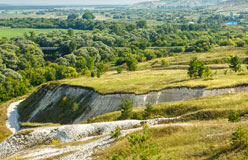If you could time-travel way ahead to the next millennium, A.D. 3000, do you think you’d understand the English speakers who will be living right where you live now? Linguists have some very different opinions about this. But just remember—a thousand years ago, the language of England was Old English, also known as Anglo-Saxon.
Here’s a sample from one of the earliest pieces of writing in Old English, a very long poem called Beowulf: “Nu ic, Beowulf, pec... secg betsta, je for sunu wylle freogan on ferhpe.” What does all that mean? “Now, Beowulf, thee of heroes best, I shall heartily love as mine own, my son.”
It doesn’t take a scholar to recognize that English has changed a lot in the past thousand years. It has also changed in the past hundred years. Languages are always changing, because people are always changing. Some changes are as simple as new words being invented to describe new things, like e-mail, while others are as profound as the shifts from Old English to Middle English to modern English.







